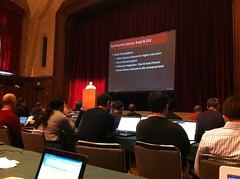This article is more than 5 years old.
I decided to devote a post to the OLE project given our interest in the direction of OLE in the coming year. Tim McGeary gave an update on the status of OLE – the project is currently in a build phase with nearly $5Million in funding from various sources.

Coding started in early February, working with HTC Global Services for a development partner. The organization is still shooting for a first test-case release in July 2011. The main project goals have not changed in the last year – community-sources, next-gen, re-examined library business processes, break away from print resources, reflect change in scholarly work, integrate with enterprise-level systems.
Tim spent a few moments talking about data storage and metadata formats – the projects is focusing on being format agnostic and is interested in supporting linked data and interchangeable workflows. The data model is visioned to include descriptive, semantic and relational data and will use the Kuali service bus to integrate with other Kuali systems.
One of the interesting aspects of the OLE system is its reliance on the Kuali Finance system. This approach offers an opportunity for universities that use Kuali for their enterprise information system to benefit from some economies of scale. This is part of the Kuali Rice framework that includes a suite of pre-built services common to many enterprise applications.
One of the questions asked for concrete advantages. .Tim listed them 1)store more data points and manage them more holistically 2) raise the library system to the enterprise level, breaking down barriers to integration, 3) break down barriers between libraries to facilitate more data sharing. Tim mentioned the possibility of a central record sharing system.
3 Comments on ‘Update on Kuali OLE’
Linked data, more data points,enterprise level, central record-sharing — all sounds good.
I had a follow-up conversation with Dianne following her chat – she suggested 1)read the 2010 article on RDA/RDF/metadata, 2)Understand what you don’t understand, 3)Play with the Metadata Services Tookit from XC to understand how this transformation might work.
“First case test release in July, 2011” I’m surprised its that soon. Do we know anyone that will be testing it?